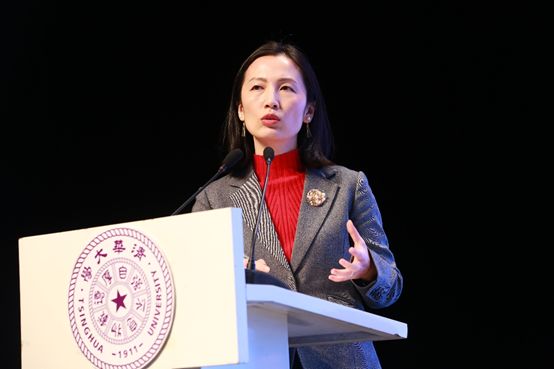Helen Hong Qiao: Stimulating domestic demand of utmost importance for current policy mix
The following is a summary of Helen Hong Qiao's comments during a roundtable discussion at the 47th Tsinghua University Forum of China and the World Economy held at Tsinghua University, Beijing, on July 6, 2024. Qiao is Managing Director, Chief Economist for Greater China and Head of Economic Research for Asia at Bank of America Securities.
On July 6, 2024, the 47th Tsinghua University Forum of China and the World Economy, hosted by Tsinghua University's Academic Center for Chinese Economic Practice and Thinking (ACCEPT) in partnership with the School of Economics and Management Alumni Center, was held on campus. Managing Director, Chief Economist for Greater China and Head of Economic Research for Asia at Bank of America Securities, Helen Hong Qiao, participated in a roundtable discussion at the forum alongside other distinguished guests where she commented on the urgent need for prioritizing policy readjustments that stimulate domestic demand and boost market confidence.

On July 6, 2024, the 47th Tsinghua University Forum of China and the World Economy was held inside the Weilun Building's main lecture hall on campus at Tsinghua University's School of Economics and Management. The biannual event was hosted by Tsinghua University's Academic Center for Chinese Economic Practice and Thinking (ACCEPT) under the theme of China's 2024 Mid-Year Economic Update. During the forum's proceedings, Helen Hong Qiao, Managing Director, Chief Economist for Greater China and Head of Economic Research for Asia at Bank of America Securities, participated in a roundtable discussion alongside other distinguished guests where she commented on the urgent need for prioritizing policy readjustments that stimulate domestic demand and boost market confidence.
After first agreeing with the viewpoint outlined in the report that the real growth rate is lower than the longer-term potential growth rate, Helen Hong Qiao emphasized that the domestic output gap does not get enough attention in China. She also mentioned that boosting confidence comes from revitalizing the economy, which is ultimately what the market is most concerned about. Managing expectations is closely linked to market confidence, with the current slip in confidence mainly being due to policy uncertainty and sluggish demand. This situation therefore calls for policy readjustments if the status quo is to be redirected in another direction. Stimulating domestic demand is of the utmost priority in terms of the latest round of policies, which, if not carried out in an opportune fashion, will otherwise put even greater pressure on the economy.
Qiao remarked on how the recent globalization trend has reversed, as Western countries raise their concerns over national security and overcapacity while calling into question China's industrial policies and subsidies, and with global public opinion increasingly turning against Chinese products. Chinese companies need to seek out new strategies to engage the global market, such as setting up factories in local markets to accommodate trade barriers. When it comes to companies going overseas, she believes that there is no other choice given the state of the domestic market. Although this approach might be conducive to maximizing profits in the shorter term, in the long run the contribution to domestic GDP and employment will prove to be limited. Therefore, Qiao once again reiterated the importance of stimulating domestic demand, including putting forward proposals covering the three domains of monetary policy, fiscal policy and incentive mechanisms. Reducing financing costs, issuing central government debt, and resetting incentives can enhance policy credibility, in addition to improving the consumption and investment environment.
As concerns rekindling confidence to attract more foreign investment into China, Qiao stressed that the main channel is to strengthen the legal system in relevant areas of concern, rather than relying on short-term policy guidance. She commented that investor sentiment and market performance are closely interrelated, with longer-term efforts focused on stabilizing the country's legal system and policy orientation being the only way to win the trust of foreign investors.




